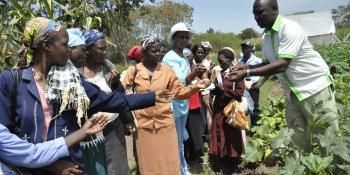Testing appropriate climate smart practices with farmers' help
Farming households in East Africa face increasing poverty levels and food insecurity due to challenges resulting from climate change and variability. In order to help farmers in the region to develop resilience to climate change, the CGIAR Research Program on Climate Change, Agriculture and Food Security (CCAFS) East Africa initiated participatory action research (PAR) across the six learning sites in East Africa.
The learning sites are located in Kenya, Nyando and Wote, Uganda, Hoima and Rakai, Tanzania in Lushoto, and Ethiopia, Borana. Within the sites, researchers and development partners are working with farmers to test climate smart agricultural interventions that can be scaled up elsewhere.
In order to address needs and priorities for research, CCAFS East Africa convened a regional science workshop in June 2012 that brought together scientists from the CGIAR and national agricultural research institutions. A major outcome of the workshop was the formation of four thematic research groups that integrate adaptation, climate risk management, mitigation and linking knowledge with action. Most of the groups have developed research proposals that are being implemented, while few groups are refining their proposals in readiness for implementation across the sites. The thematic groups will work with non-governmental organizations, community based organizations and government extension services.
As a follow up to the regional science workshop and to integrate the work of research and development partners across the learning sites, CCAFS East Africa hosted a four-day workshop on November in Kisumu, Kenya.
The workshop brought together research- and development partners engaged in PAR for climate smart agriculture from all the six learning sites in the region. The aim of the workshop was to build stronger partnership within and across learning sites, and to ensure efficient coordination of climate smart agricultural activities among research and development partners. In addition, the workshop reviewed appropriate climate-smart technologies for on-farm testing at different sites.
The workshop provided a platform to share ongoing work at the different sites in the region and to identify synergies across learning sites. The workshop presentations included:
- Testing the design and communication of downscaled, probabilistic seasonal forecasts; and evaluating their impact on farmers’ management and livelihood outcomes at Wote, Kenya (by International Crops Research Institute for the Semi-Arid Tropics (ICRISAT)
- Addressing climate change through building farmers’ functional coping strategies in Uganda: Participatory evaluation of drought tolerant bean varieties in Hoima and Rakai districts in Uganda (by International Centre for Tropical Agriculture, CIAT-PABRA)
- Addressing climate change through testing innovations and supporting risk management for rural communities in Lushoto district, Tanzania (by Selian Agricultural Research Institute, SARI)
- Social innovation and rangeland enclosure to adapt to a changing climate to achieve food security: A case study on climate risk management in Borana, Ethiopia (by Managing Risks for Improved Livelihoods, MARIL)
- Participatory evaluation of sorghum for yield, adaptability and farmer preference in Nyando, Kenya (by Kenya Agricultural Research Institute, KARI- Kibos Station)
- Enhancing Food Security through Managing Climate Risks in Agricultural Systems in Nyando, Kenya (by World Neighbours)
The strategies identified for building and strengthening partnerships include a clear definition of roles and responsibilities of all partners and regular joint activity planning workshops.
Local farmers should also be actively involved in identification of needs and prioritization of activities that will help create climate smart villages.
Workshop participants identified site specific climate smart agricultural practices. These include introduction of small ruminants and poultry, drought tolerant crop varieties (cereals, legumes, root crops, and vegetables), and intensive crop production in green houses. With regard to natural resource management, various soil and water conservation measures were proposed; like terracing, strip cropping, water harvesting pans, trash lines, agro-forestry, and contour ploughing.
CCAFS will continue to work with partners to test the proposed climate smart technologies across the learning sites.
A key challenge identified by participants was how to continuously document lessons, share knowledge outputs and learn from experiences. The CCAFS regional program is developing a Communication and Knowledge Management Strategy (CKMS) to guide this. In addition, CCAFS will facilitate write-shops for partners to synthesize and document lessons emerging from project activities.
In the meantime, participants agreed to work with CCAFS to document and share ongoing activities through blog posts, video and picture stories, working papers and reports.
The workshop concluded with a field trip to the Nyando site. The objective of the field trip was to experience how farmers manage their land, crops, soil, water, livestock and other natural resources in the context of a changing climate to improve their well-being.
Read more about how farmers in East Africa are adapting already.
Catherine Mungai, John Recha, Maren Radeny and James Kinyangi are all part of CCAFS East Africa Regional program team. Follow CCAFS East Africa on Twitter.


